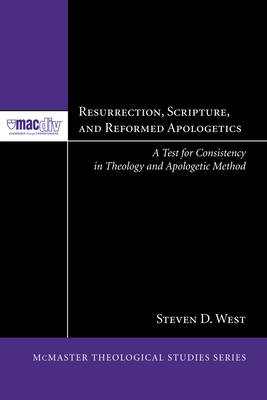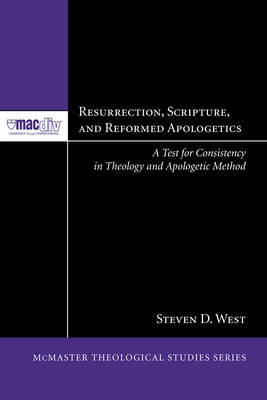
- Retrait gratuit dans votre magasin Club
- 7.000.000 titres dans notre catalogue
- Payer en toute sécurité
- Toujours un magasin près de chez vous
- Retrait gratuit dans votre magasin Club
- 7.000.000 titres dans notre catalogue
- Payer en toute sécurité
- Toujours un magasin près de chez vous
Description
Apologetic methodology has been the subject of intense debate in Reformed circles. This book argues that we can test Reformed apologetic methods for consistency using two linchpin theological topics: the doctrine of the resurrection and the doctrine of Scripture. Should apologetics move from establishing theism to the resurrection and then to Scripture? Or should theism, the resurrection, and the doctrine of Scripture be accepted on the testimony of the Holy Spirit as basic beliefs? Alternatively, do these doctrines need to be presupposed and incorporated into a transcendental defense of the faith? After analyzing classical apologetics, historical evidentialism, Reformed epistemology, and presuppositionalism for their apologetic cogency, Steven D. West contends that any method used by Reformed apologists should be able to argue successfully for a high view of Scripture, the source of the doctrine of the resurrection. The book will be useful to everyone interested in the relationship between theology, philosophy, and apologetics. ""Debate has raged within evangelicalism regarding proper apologetic methodology with little progress. However, in this very helpful work, West breaks the impasse and navigates current apologetic approaches within Christian theology in a highly readable way. He then argues cogently for a presuppositional method that incorporates the best of the other approaches. In a short space, West not only introduces us to contemporary apologetic polemics, he also points the way forward. I highly recommend this work."" --Stephen J. Wellum, Southern Baptist Theological Seminary ""There are at least three reasons why I highly welcome and recommend this book. First, there is the relevance of and necessity for truly Reformed apologetics in these turbulent times. Second, there is a great need for consensus of opinion on the best possible methodology--based on sound philosophical and other principles--in the implementation of Reformed apologetics. And finally, there is a constant and urgent need for sound doctrine on Scripture and the resurrection . . . The depth and honesty of his research add value to Reformed theology in the global context."" --Callie Coetzee, North West University ""West writes the way he speaks, with clarity, conviction, coherence, and an appropriate sense of humility. His incisive analysis of Reformed approaches to apologetics convincingly shows the necessity of a presuppositional and transcendental orientation, while taking seriously the important contributions of Reformed apologists from other schools of thought . . . An important primer on Christian apologetics and a valuable addition to the library of student, pastor, and apologist alike."" --Joe Boot, Ezra Institute for Contemporary Christianity Steven D. West is an adjunct professor at Toronto Baptist Seminary where he teaches Research and Philosophy. He is also the pastor of Madoc Baptist Church in Madoc, Ontario.
Spécifications
Parties prenantes
- Auteur(s) :
- Editeur:
Contenu
- Nombre de pages :
- 238
- Langue:
- Anglais
- Collection :
- Tome:
- n° 5
Caractéristiques
- EAN:
- 9781498262453
- Date de parution :
- 26-07-12
- Format:
- Livre relié
- Format numérique:
- Genaaid
- Dimensions :
- 152 mm x 229 mm
- Poids :
- 485 g







